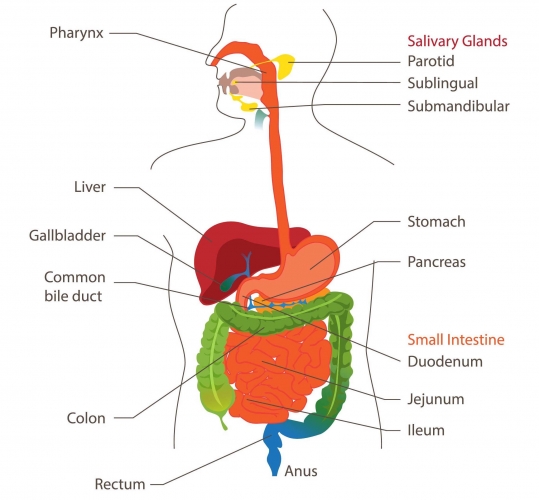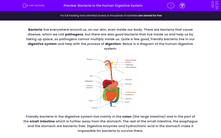Bacteria live everywhere around us, on our skin, and even inside our bodies. There are bacteria that cause disease, which we call pathogens, but there are also good bacteria that live inside us and help us by taking up space, so pathogens cannot multiply inside us.
Quite a few good, friendly bacteria live in our digestive system and help with the process of digestion. Below is a diagram of the human digestive system:

Friendly bacteria in the digestive system live mainly in the colon (the large intestine) and in the part of the small intestine which is furthest away from the stomach. The rest of the small intestine, the oesophagus and the stomach are bacteria-free. Digestive enzymes and hydrochloric acid in the stomach make it impossible for bacteria to survive there.
It is estimated that around 100 trillion friendly bacteria live in our gut. If we were to extract them, they would have a mass of 1 kg. There are between 300 and 1,000 different species, with 50 of them the most common.

Friendly gut bacteria have evolved in order to withstand the harsh conditions of our digestive system.
The main advantage of having friendly bacteria in the gut is protection against harmful bacteria that would otherwise cause infection and invade the cells of the intestinal wall. Additionally, bacteria help with the digestion of materials that we are unable to digest, like hard plant material.

A lot of the vitamins from vegetables would be wasted if it wasn't for the friendly bacteria that digest them for us. Some species produce vitamins K and B that are hard for us to obtain from food. They also maintain the acidity balance and break down some drugs, hormones not needed anymore and toxins that would be potentially dangerous to our health.
The population of bacteria in our gut is renewed regularly - about half the dry mass of our faeces consists of bacteria.
While it might seem strange to think that there are around 100 trillion other organisms living inside us, they are very important to our health and in this activity we'll find out why.







